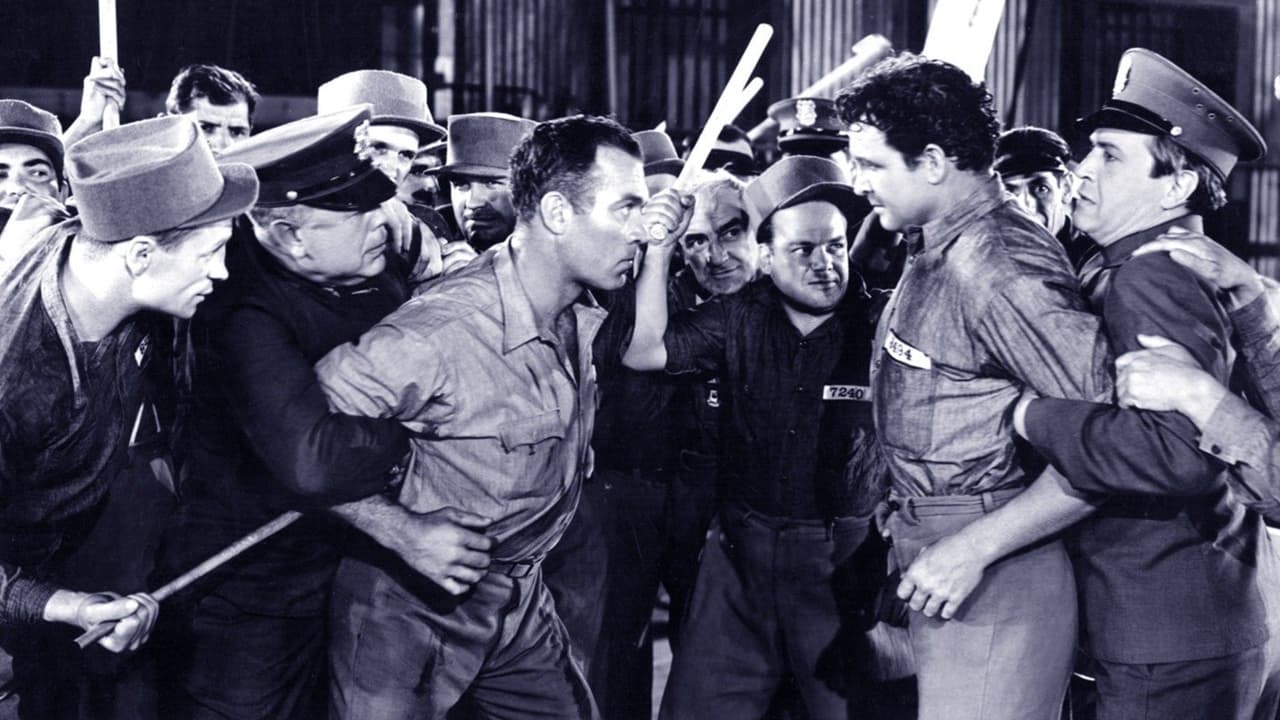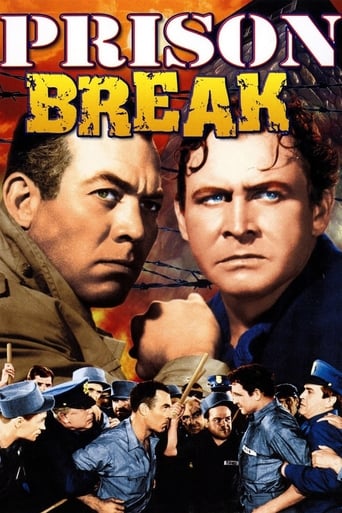



What a beautiful movie!
If the ambition is to provide two hours of instantly forgettable, popcorn-munching escapism, it succeeds.
View MoreGood films always raise compelling questions, whether the format is fiction or documentary fact.
View MoreBlistering performances.
Moderately decent B drama about a hard working fisherman wrongly accused of murder who ends up in prison, gets a parole, which means jack squat when he tries to find a job. Barton MacLane isn't traditional leading man material, but kept getting leads in B's throughout the late 1930's into the mid 1940's. Sort of a second choice to roles that didn't go to Charles Bickford, he's a dependable character actor who rose above supporting roles. He's supported by Glenda Farrell, aka Torchy Blane, playing his devoted fiancé who stands by him even though her abusive father and brute brother vow to keep them apart. It's fast moving and truthful, but just one of many on the same subject. Good waterfront scenery and a believable prison break are the highlights. When MacLane tries to take a job out of the country and is reminded by his parole officer that he's not allowed to leave the state, all I could say is duh, wondering why the writers thought that it would be believable for him to even try. Minor complaint, but it was just too obvious to overlook.
View MoreDirector Arthur Lubin's "Prison Break" is a sophisticated but formulaic incarceration saga about that doesn't violate the rigorous dictates of the Hays Office, a.k.a., the Production Code Administration. The Production Code Administration (PCA) censored Hollywood movies from 1930 to 1968 according to a rule book of sorts known as the 'production code.' Sometimes, the PCA convinces the studios not to produce certain films based on the subject matter. Lubin's glimpse at the unsavory life behind-prison-walls and the heartless justice system isn't business as usual. Prison movies have always been popular. Typically, the protagonist was a convict who suffered at the hands of the system until he was an undercover cop. The PCA said that all legal institutions had no flaws in their constitution. When Hollywood exposed the flaws of the prison system in "I Am a Prisoner on a Chain Gang" (1932), the blame fell on individuals abusing the system rather than the system itself. Often, the Hays Office allowed these flaws because they represented anomalous behavior. In "Prison Break," the integrity of our hero is untainted from the start; he shoulders the blame for a crime he didn't commit. Afterward, to his chagrin, he discovers the cruel attitude that the system takes to convicts. Inevitably, all prison movies are about a plan to break out. The titular event occurs about 40 minutes into this above-average 72-minute B-picture. Technically, the studio should have called it "Attempted Prison Break." As it turns out, nobody scales the walls, but an innocent inmate dies tragically in the attempt. Predictably, the message in this Universal Pictures' release is that 'crime doesn't pay.' Ironically, the virtuous protagonist lands behind bars because he embraces the principle of self-sacrifice. Self-sacrifice emerges as a clear theme, and it enhances the narrative because the hero is impeccably immaculate until the system taints him. Consequently, "Prison Break" doesn't indict the system because our hero's imprisonment isn't punishment as usual. The villains wield the system as a weapon against our self-sacrificial hero. Nevertheless, everything comes out of the wash, and the hero is redeemed and the villains castigated.Tuna boat skipper Joaquin Shannon (Barton MacLane of "High Sierra") wants to marry Jean Fenderson (Glenda Farrell of "Little Caesar") who loves him. Jean's little boy Jackie (Johnny Russell) adores Joaquin, too. Nevertheless, Jean's obstinate father, Old Man Fenderson (Victor Kilian of "The Ox-Bow Incident"), objects to her relationship with him on the basis of racism. He ridicules Joaquin as "a thieving Portuguese who hides behind an Irish name." Jean's shady brother Joe (Edward Pawley of "G-Men") supports their father's sentiments about Joaquin. "Dad's right about him, sis, the guy's no good." The Old Man assures Jean he run Joaquin off the waterfront. Jean gives her dad her walking papers. He threatens to take Jackie away from her, but she isn't afraid, especially since he didn't approve of her first marriage. Comparably, MacLane's blue-collar, Portuguese fisherman reminded me of Edward G. Robinson's Mike Mascarenhas in Howard Hawks' "Tiger Shark" made back in 1932. Lubin and scenarists Norton S. Parker, who wrote dozens of westerns, and "Rhubarb" scribe Dorothy Davenport utilize Joaquin's ethnic identity as a way to trigger tension. Mind you, Joaquin doesn't suffer the loss of a limb owing to a work-related accident. Nevertheless, Joaquin qualifies as a victim of the social system, too. During a marriage dinner, Chris Nelson (Edmund MacDonald of "Flying Tigers") gets too drunk, and Joaquin takes him outside. Dastardly Big Red Kincaid (Ward Bond of "The Searchers") walks into the bar during the marriage celebration. Moments before Chris staggers off toward the bar, Joe Fenderson steps up to the bar and flashes a wad of cash that Red doesn't miss. Meantime, Joaquin leaves Chris outside to sober up. Joe see Joaquin, has words with him, and they fight. Joaquin is restrained while Joe leaves. Red follows Joe outside and stabs him to death. Chris staggers up to Red and Red knows him unconscious. Joaquin finds Chris. Joaquin takes the blame to shield his future brother-in-law, Maria's Bridegroom, from being arrested. Joaquin draws a one to ten year stretch in San Quentin Penitentiary for this manslaughter charge. It takes Joaquin 19 minutes to wind up in prison. Jean waits for him, and eventually Joaquin gets paroled. At the same time, he doesn't know that Red murdered Joe until the final few minutes of this melodrama. Unfortunately, parole prevents Joaquin from plying the trade that he knows best. Later, Joaquin and Red have a knuckle-bruising brawl and our hero triumphs over Red. Red spent his time in prison, making life miserable for an abject Joaquin who has sworn to not stick his neck out and get in trouble. Red baits and frames Joaquin repeatedly, which turns the parole board initially against Joaquin and adds years to his sentence. After Joaquin foils Red's armed prison escape, our hero gets a three year parole, but the system appears to work against him.
View MoreThis surprisingly powerful and compelling film starts weakly with a hackneyed tale of a curmudgeonly father opposing his daughter's choice of a mate.Glenda Farrell's Jean sees the hero behind the burly fisherman with a fascinating face, Barton MacLane, and waits for him through a maddeningly unfair series of arrests and punishments in prison. Shannon is the archetypal Everyman with integrity who just can't catch a break -- until the romantic final scene, when the good guy triumphs and finally gets the girl. The perfect ending is a bit anticlimactic but once in a while a happy conclusion manages to satisfy. A bravura production that I'll not soon forget.
View MoreIn one of his rare appearances as a lead, Barton MacLane gives what may be his best performance, playing the part of Joaquin Shannon, an Irish-Portuguese tuna fisherman off the Southern California coast who, due to his protection of his younger brother, is wrongfully convicted of manslaughter and sent to prison. The film has an apparent message, i.e., that a parolee has few rights as a citizen, but this takes up little filmic space while the struggle of Shannon to clear his name produces plenty of action, both in and out of the penitentiary, as he must deal with a cruel adversary, Red Kinkaid (Ward Bond) and still find time to woo his sweetheart, played by Glenda Farrell in one of her softer roles. As opposed to today, the Depression era status of released convicts, as this 1938 work demonstrates, proscribed their marrying, and this disappointment in addition to Shannon's inability to find a job propels him into situations which bring about a showdown with the dangerous Kincaid, for whom Shannon unwittingly served his time. Routinely directed by journeyman Arthur Lubin, the film benefits from effective editing by Jack Ogilvie and skillful work by cinematographer Harry Neumann, with scenes varied among commercial ocean fishing, penitentiary life, taverns,and fog-bestrewn docks preventing any slowdown during this rapidly paced movie, although both dialogue and action are marked by cliche and are somewhat predictable. MacLane's staunch performance is matched in impact by the vigorous Bond, while Farrell, although quick with a quip as ever, is rather winning in her turn as a steadfast paramour; others displaying strong interpretations are Victor Kilian as Farrell's father and Paul Hurst as a convict on the lam.
View More